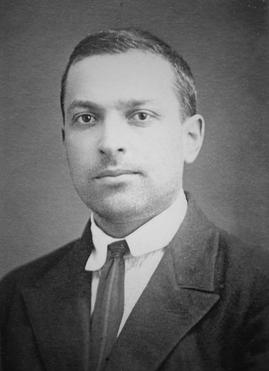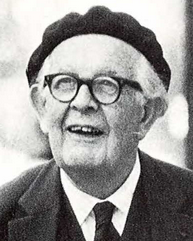
Developmental psychology is the scientific study of how and why humans grow, change, and adapt across the course of their lives. Originally concerned with infants and children, the field has expanded to include adolescence, adult development, aging, and the entire lifespan. Developmental psychologists aim to explain how thinking, feeling, and behaviors change throughout life. This field examines change across three major dimensions, which are physical development, cognitive development, and social emotional development. Within these three dimensions are a broad range of topics including motor skills, executive functions, moral understanding, language acquisition, social change, personality, emotional development, self-concept, and identity formation.

Lev Semyonovich Vygotsky was a Russian psychologist, best known for his work on psychological development in children and creating the framework known as cultural-historical activity theory. After his early death, his books and research were banned in the Soviet Union until Joseph Stalin's death in 1953, with a first collection of major texts published in 1956.

Jean William Fritz Piaget was a Swiss psychologist known for his work on child development. Piaget's theory of cognitive development and epistemological view are together called genetic epistemology.

James Mark Baldwin was an American philosopher and psychologist who was educated at Princeton under the supervision of Scottish philosopher James McCosh and who was one of the founders of the Department of Psychology at Princeton and the University of Toronto. He made important contributions to early psychology, psychiatry, and to the theory of evolution.

Early childhood education (ECE), also known as nursery education, is a branch of education theory that relates to the teaching of children from birth up to the age of eight. Traditionally, this is up to the equivalent of third grade. ECE is described as an important period in child development.
The study of how language influences thought, and vice-versa, has a long history in a variety of fields. There are two bodies of thought forming around this debate. One body of thought stems from linguistics and is known as the Sapir–Whorf hypothesis. There is a strong and a weak version of the hypothesis which argue for more or less influence of language on thought. The strong version, linguistic determinism, argues that without language there is and can be no thought, while the weak version, linguistic relativity, supports the idea that there are some influences from language on thought. And on the opposing side, there are 'language of thought' theories (LOTH) which believe that public language is inessential to private thought. LOTH theories address the debate of whether thought is possible without language which is related to the question of whether language evolved for thought. These ideas are difficult to study because it proves challenging to parse the effects of culture versus thought versus language in all academic fields.
The psychology of learning refers to theories and research on how individuals learn. There are many theories of learning. Some take on a more behaviorist approach which focuses on inputs and reinforcements. Other approaches, such as neuroscience and social cognition, focus more on how the brain's organization and structure influence learning. Some psychological approaches, such as social constructivism, focus more on one's interaction with the environment and with others. Other theories, such as those related to motivation, like the growth mindset, focus more on individuals' perceptions of ability.

Constructivism is a theory in education which posits that individuals or learners do not acquire knowledge and understanding by passively perceiving it within a direct process of knowledge transmission, rather they construct new understandings and knowledge through experience and social discourse, integrating new information with what they already know. For children, this includes knowledge gained prior to entering school. It is associated with various philosophical positions, particularly in epistemology as well as ontology, politics, and ethics. The origin of the theory is also linked to Swiss developmental psychologist Jean Piaget's theory of cognitive development.

Piaget's theory of cognitive development, or his genetic epistemology, is a comprehensive theory about the nature and development of human intelligence. It was originated by the Swiss developmental psychologist Jean Piaget (1896–1980). The theory deals with the nature of knowledge itself and how humans gradually come to acquire, construct, and use it. Piaget's theory is mainly known as a developmental stage theory.
Cognitive development is a field of study in neuroscience and psychology focusing on a child's development in terms of information processing, conceptual resources, perceptual skill, language learning, and other aspects of the developed adult brain and cognitive psychology. Qualitative differences between how a child processes their waking experience and how an adult processes their waking experience are acknowledged. Cognitive development is defined as the emergence of the ability to consciously cognize, understand, and articulate their understanding in adult terms. Cognitive development is how a person perceives, thinks, and gains understanding of their world through the relations of genetic and learning factors. There are four stages to cognitive information development. They are, reasoning, intelligence, language, and memory. These stages start when the baby is about 18 months old, they play with toys, listen to their parents speak, they watch TV, anything that catches their attention helps build their cognitive development.
Egocentrism is the inability to differentiate between self and other. More specifically, it is the inability to accurately assume or understand any perspective other than one's own. Egocentrism is found across the life span: in infancy, early childhood, adolescence, and adulthood. Although egocentric behaviors are less prominent in adulthood, the existence of some forms of egocentrism in adulthood indicates that overcoming egocentrism may be a lifelong development that never achieves completion. Adults appear to be less egocentric than children because they are faster to correct from an initially egocentric perspective than children, not because they are less likely to initially adopt an egocentric perspective.

The zone of proximal development (ZPD) is a concept in educational psychology. It represents the space between what a learner is capable of doing unsupported and what the learner cannot do even with support. It is the range where the learner is able to perform, but only with support from a teacher or a peer with more knowledge or expertise. The concept was introduced, but not fully developed, by psychologist Lev Vygotsky (1896–1934) during the last three years of his life. Vygotsky argued that a child gets involved in a dialogue with the "more knowledgeable other" such as a peer or an adult and gradually, through social interaction and sense-making, develops the ability to solve problems independently and do certain tasks without help. Following Vygotsky, some educators believe that the role of education is to give children experiences that are within their zones of proximal development, thereby encouraging and advancing their individual learning such as skills and strategies.
Cultural mediation describes a profession that studies the cultural differences between people, using the data in problem solving. It is one of the fundamental mechanisms of distinctly human development according to cultural–historical psychological theory introduced by Lev Vygotsky and developed in the work of his numerous followers worldwide.

Child development involves the biological, psychological and emotional changes that occur in human beings between birth and the conclusion of adolescence.
Infant cognitive development is the first stage of human cognitive development, in the youngest children. The academic field of infant cognitive development studies of how psychological processes involved in thinking and knowing develop in young children. Information is acquired in a number of ways including through sight, sound, touch, taste, smell and language, all of which require processing by our cognitive system. However, cognition begins through social bonds between children and caregivers, which gradually increase through the essential motive force of Shared intentionality. The notion of Shared intentionality describes unaware processes during social learning at the onset of life when organisms in the simple reflexes substage of the sensorimotor stage of cognitive development do not maintain communication via the sensory system.

Kenneth Kaye was an American psychologist and writer whose research, books, and articles connect the fields of human development, family relationships and conflict resolution.
Social interactionist theory (SIT) is an explanation of language development emphasizing the role of social interaction between the developing child and linguistically knowledgeable adults. It is based largely on the socio-cultural theories of Soviet psychologist, Lev Vygotsky.
In the framework of the Cultural-Historical Activity Theory (CHAT) the leading activity is the activity, or cooperative human action, which plays the most essential role in child development during a given developmental period. Although many activities may play a role in a child's development at any given time, the leading activity is theorized to be the type of social interaction that is most beneficial in terms of producing major developmental accomplishments, and preparing the child for the next period of development. Through engaging in leading activities, a child develops a wide range of capabilities, including emotional connection with others, motivation to engage in more complex social activities, the creation of new cognitive abilities, and the restructuring of old ones.
Cultural-historical activity theory (CHAT) is a theoretical framework which helps to understand and analyse the relationship between the human mind and activity. It traces its origins to the founders of the cultural-historical school of Russian psychology L. S. Vygotsky and Aleksei N. Leontiev. Vygotsky's important insight into the dynamics of consciousness was that it is essentially subjective and shaped by the history of each individual's social and cultural experience. Especially since the 1990s, CHAT has attracted a growing interest among academics worldwide. Elsewhere CHAT has been defined as "a cross-disciplinary framework for studying how humans purposefully transform natural and social reality, including themselves, as an ongoing culturally and historically situated, materially and socially mediated process". Core ideas are: 1) humans act collectively, learn by doing, and communicate in and via their actions; 2) humans make, employ, and adapt tools of all kinds to learn and communicate; and 3) community is central to the process of making and interpreting meaning – and thus to all forms of learning, communicating, and acting.
Lois Holzman is director and co-founder of the East Side Institute in New York, New York, where she developed social therapy methods with Fred Newman. She is known for her research and work on play therapy, social therapy, and criticism of the medical model of mental health. She was instrumental in introducing the ideas of Lev Vygotsky to the fields of psychotherapy, organizational and community development. In 2014, Holzman received the Lifetime Achievement Award from the Cultural-Historical Research Special Interest Group of the American Educational Research Association.










